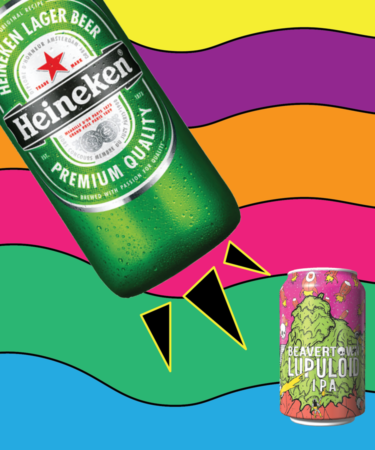On Thursday, June 21, cult U.K. brewery Beavertown announced its partial sale to Heineken International. Although all details of the transaction were not disclosed at press time, Beavertown founder and CEO Logan Plant described Heineken as a minority partner and confirmed Heineken’s stake will provide 40 million pounds (about $53 million) to build Beaverworld, a new brewery and visitor site in London.
Beavertown’s announcement sings a familiar tune:
“We retain full control of our destiny. […] We retain the freedom to do our own thing. The relationships with our accounts, distributors, suppliers and brewing family and friends stays exactly the same. Who we work with and how we work with them stays exactly the same. I can’t stress enough how imperative this has been to us throughout the process. Heineken do not want us to conform or change.”
What will change, he says, is the building of Beaverworld, the name of a new 450,000-hectoliter (383,000-barrel) facility slated to open in late 2019. Additionally, the brewery is planning to open a brewery at Tottenham Hotspur stadium in London.
Unsurprisingly, the U.K. craft beer industry is not thrilled.
Cloudwater Brew Co., another U.K.-based brewer, withdrew from Beavertown’s Extravaganza event. “If we had known early this year that Beavertown was working on a minority sale to Heineken, the world’s second biggest beer company behind AB InBev, we’d have pulled out months ago,” Cloudwater wrote in a blog post. It continued, “Our decision to withdraw is based at its core on us standing up for independence, and standing against disturbing corporate tactics employed by big beer that should never have any place in craft beer.”
James Watt, co-founder of Scotland-based BrewDog, said on Twitter that his brewery will also be pulling out of the Beavertown festival.
We will no longer be selling Beavertown beers or attending Beaver Ex. I wrote this piece in 2015 but it seems very relevant today too https://t.co/36Jn93MRI3
— James Watt (@BrewDogJames) June 21, 2018
Heineken also has a stake in London’s Brixton Brewery, as well as in Belize Brewing, and wholly owns Lagunitas Brewing of California.
And so, America has not only exported our love of craft beer; we’ve exported its indie-or-die ethos. The staunch belief in independence that catapulted our beer industry to nearly 6,500 breweries has sailed back across the pond, and it’s making some waves.
Take it from us, U.K. craft beer geeks. The beer industry can be stormy. Don’t be like us and get upset every time one of them sells to MegaBeer. As long as our beer options remain copious, we needn’t anguish over people running successful businesses. Being a hater is never a good look. Perk up. Move on. There are plenty more beavers, or rather, fish in the sea.
MillerCoors Threatens to Drop PBR
Pabst Brewing has filed a $400 million lawsuit against MillerCoors because it’s worried about its contract — a fear with which many of us current and former freelancers can relate.
MillerCoors currently brews all Pabst Brewing legacy beers, including Pabst Blue Ribbon (PBR) and Old Milwaukee. If MillerCoors doesn’t renew its contract expiring in 2020, as it recently threatened, Pabst will need to find somewhere else to brew much of its beer. This could be devastating to PBR.
MillerCoors says it may not have the brewing capacity to continue brewing Pabst beers. The macro brewer has seen its own volumes decline and may be forced to shutter its facility in Irwindale, Calif., CNBC reports. It also closed a brewery in Eden, N.C., in 2016. Currently, MillerCoors operates seven breweries in the U.S., including Irwindale.
It’s a cold world out there in the beer business — cold as the Rockies, one might say — and there’s only so much room for chilly light lagers out there. As competition ramps up in the beer segment, PBR is an unnecessary adversary to MillerCoors’ market share. MillerCoors and its owner, Molson Coors, don’t want people drinking PBR. They want people drinking Coors, Miller, Keystone, and the new millennial-facing light lager, Two Hats.
Regardless of its heritage or hipster appeal, PBR will lose this battle. Big Beer doesn’t care about legacy brands other than its own. MillerCoors doesn’t mind if the future post-2020 holds less Old Milwaukee. And although this possibility is sad for Pabst fans, quite frankly, I won’t miss either. Its legacy has been co-opted by hipster nonsense, and there are plenty of other fizzy, bland-tasting macro lagers you can buy. (I’m partial to Miller High Life.)
Schubros Brewery Shutters, Blames It on Everything but Bad Beer
A Bay Area brewery that had plans to expand to China recently announced it will be closing. Founder Ian Schuster blames everything from Trump’s tariffs to the rising minimum wage to the brewery’s distributor for the closure.
However, patrons of the brewery have a different idea: The beer was bad, and Schuster had no idea how to run a brewery.
I’ve personally never heard of Schubros Brewery, so I can attest to the fact that its beers weren’t exactly lauded. My guess is, this isn’t about Trump (though I’d love to blame everything on him), this isn’t about the minimum wage (are you kidding? Pay your workers fairly!), and this isn’t about your distributor (the three-tier system, while it has its flaws, is working fine for many breweries). It’s about an inexperienced entrepreneur trying to cash in on the craft beer trend and failing. Sorry, dude.
